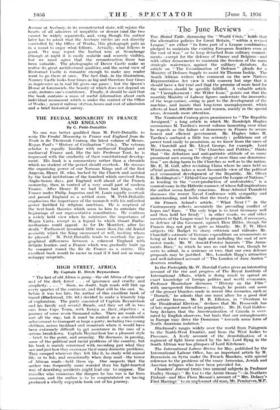-The- June Rev iews
THE Rinind *Table, disenssing the " World Crisis," 'hold.; that the alternative policies for Great Britain, " within a revised League," are either " to form part of a League combination pledged to maintain the existing European frontiers even at the cost of-war," or to keep detached from military conunit- ments—except for the -defence of France and Belgium—and with other ,democracies to maintain the freedom of' the main strategic waterways,, against the military dictators. An article on " The Co-ordination of Defence " pleads for a Ministry of Defence Supply to assist Sir Thomas Inalcip. The South African writers who comment on the new Natives Representation Act view it with concern but urge that it should have a fair trial and that the promise of more land for the natives should be speedily'lulfilled. A valuable article on " Unemployment : the Wider Issue," points out that the monthly Ministry of Labour figures understate the insecurity of the wage-earner, owing in part to the development of the machine, and insists that loneerm unemployment, which affects at least 300,000 men and Women, mainly in the special areas, demands more attention.
The Nineteenth Century gives profninence to "The Republic Arraigned," a long article in which Mr. Randolph Hughes summarises M. Tardieu's recent volume lamenting over what he regards as the failure of democracy in France to secure honest and efficient government. • Mr. Hughes takes M. Tardieu's outburst a little too seriously ; politicians out of power tend easily to pessimism, as we know from the cases of Mr. Churchill and Mr. Lloyd George, for example. Lord Winterton, writing on "The Churches and Politics," thinks that the defeatism and anti-patriotic attitude of so many prominent men among the clergy of more than one denomina- tion " are doing harm to the Churches as well as to the nation. Mr. E. M. Gull, after revisiting China where he once held an ofncial position, takes a most favourable view of the political and economical development of the Republic. Mr. Oliver E. litoddington's " Ethical Case against the League of Nations," as tending to the "over-production of undesirables," is a comical essay in the Iiitlerite manner, of whose full implications the author seems hardly conscious. Rear-Admiral Thursfield discusses the recent Naval- Conference with sympathy and understanding, and holds that the treaty is valuable.
Sir Francis Acland's article, "What Next ? " in the Contemporary reflects accurately the prevailing conflict of hopes and fears.. "The only hope is to treat Germany well and then hold her firihry " ; in other words, we and other members of the League must be prepared to fight; if necessary, in defence of the- Covenant, against Herr Hitler, though Sir Francis does_ not put it quite so bluntly. Mr. F. W. Hirst subjects the )1 uagef to sharp criticism and 'ridicules Mr. Churchill's estimate-a-Gen-lam expenditure on armamemts as being at least taiee too high and including the cost of new motor Toads.. Mr. W: Arnold-Forster laments The -Arma- ments Race," .to which he sees no end but war, though he seem to admit, In a sentence or two, that our own defence proposals may be justified. Mrs. Lonsdale •Ragg's attractive and well-informed account of The London of Jane Austen" deserves reading.
In the Fortnightly Mr. W. HorsfaH Carter gives an interesting account of the rise and progress of The, Royal Institute of International Affairs, which is doing much to spread an exact knowledge of foreign- polities and world economics. Professor Hearnshaw discusses History on the Film" with unexpected friendliness ; though he points out some of the grosser 'blundersmade in recent film scenarios, such as
Disraeli," he admits that one must allow for a good deal of artistic license. Mr. H. B. Elliston, in "Overture to the Presidential Election." declares that Mr. Roosevelt has of late regained much of his popularity: Mr. H. Carl Golden- berg declares that the Americanisation of Canada is over- rated by English observers, but hints that our entanglements in Europe may drive tfie Dominion "towards some form of North American- isolation." - .
Blaikwood's ranges widely over the -world from Patagonia to the North-West Frontier, and from the West' Indies to Provence.. A lively, account of the' demobilisation of a regiment of light horse raised by the late Lord Byng in the South African war has glimpses of Lord Kitchener.
The International Labour Review for May, published by the International Labour Office, has an important article by M. Berenstein on Syria under the French Mandate, with special reference to the problems of the *many Armenian, Jewish and Assyrian refugees who have been provided for.
Chambers' Journal treats two unusual subjects in Professor Dudley Stamp's By Car to tke,Aretie Ocean "—in Northern Finland—and Miss Flora Masson's account of " Mrs. Delany's First Marriage" to an unpleasant old man, Mr. Pendarists














































 Previous page
Previous page